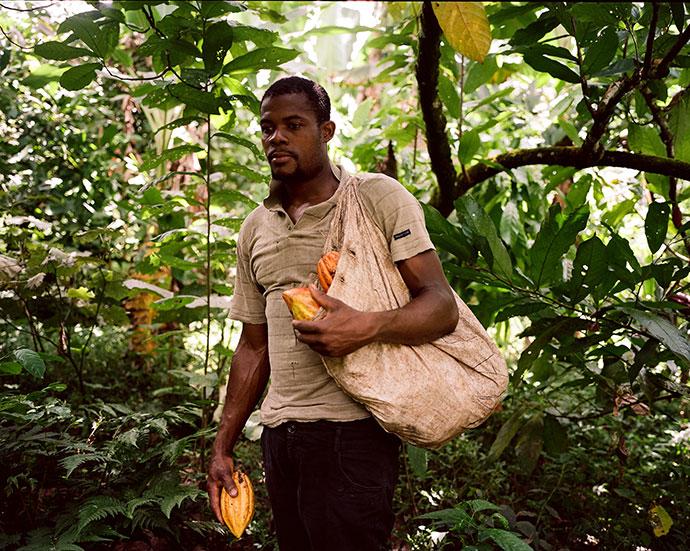One of our goals as a company in 2018 was to source a supply of organic Fairtrade cocoa to create an exciting new range of bars. We identified the CECAQ-11 co-operative in São Tomé as a promising option. It was already delivering a high quality traceable supply via GEPA, a leading Fairtrade manufacturer and distributor in Germany, and it had a long-time partnership with our fellow Fairtrade company Cafédirect.
São Tomé is a small island in the Gulf of Guinea south-east of Ghana, with a beautiful lush landscape of tropical rainforest, perfect for growing cocoa. In the early 1900s, its cocoa industry led the world, but more recently it all but collapsed completely. Now, there are efforts to regenerate the island’s cocoa business led by the farmers themselves, formed into co-operatives, with help from NGOs on the ground. These initiatives have a new focus on quality - with premiums from Fairtrade and organic certification - rather than quantity.
In April 2018, a team from Divine and a representative from our partner and owner Twin*, went out to meet members and management of CECAQ-11 to find out more about how it was run, the challenges facing farmers, and what their priorities were in terms of investing in their farms, communities, and their futures.
The co-operative has around 1,214 members (over a third are women), organised into 20 village associations. Each village of 40-60 producers has its own facilities for fermentation, drying, and storage.
The farmers agree democratically on how to spend the Fairtrade premium and are already investing it judiciously -- one example being a wonderful nursery and daycare centre to help mothers get back to work. However, there are still many challenges, and securing a sustainable income and future for these cocoa farmers is still precarious.
Twin carried out a producer assessment and collected key data on the organisation, its membership, and farming practices. A number of other local stakeholders were also interviewed in order to assess CECAQ-11’s viability as a supply partner and how it might be involved in the Producer Support & Development (PS&D) programme going forward.
It was an equally important opportunity for the co-op’s management and members to assess Divine as a good customer and partner. We have now come to a trading agreement and hope this will be the start of a mutually beneficial partnership which will not only deliver a Fairtrade premium, but also a share of its PS&D fund to give support to the co-operative’s agricultural extension work and gender justice programme.
We were accompanied on our trip to São Tomé by internationally acclaimed photographer David Chancellor, who had been commissioned to contribute to the forthcoming We Feed the World exhibition and campaign highlighting the crucial importance of smallholder farmers to the world’s future food security. David captured many stunning images for the exhibition, including this overhead photograph of one of the farmers’ villages.
In addition to the two income streams farmers receive that are connected to Fairtrade (minimum price & a premium) and the dividends Kuapa Kokoo receives from co-ownership, 2% of Divine’s annual turnover is invested in a Producer Support and Development fund (PS&D). This directly funds specific Kuapa projects, with a proportion also going towards projects with farmers in other areas of Africa. These initiatives are aligned with the UN’s Sustainable Development Goals and include projects such as delivering training, helping with governance, and promoting gender equality and land rights.
The PS&D programme is delivered in association with Divine’s partner Twin and Twin Trading Ltd., a major shareholder and founder of Divine Chocolate Ltd. Twin is a pioneer and leader of the fair trade movement, working to build better lives for the poorest and most marginalised in the trading chain.



